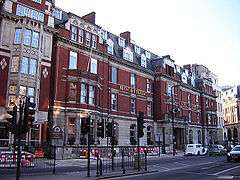UCL Partners
| UCL Partners | |
|---|---|
|
UCL Partners logo | |
| Geography | |
| Location | London, England |
| Organisation | |
| Care system | NHS |
| Hospital type | Academic health science centre |
| History | |
| Founded | 2009 |
| Links | |
| Website | http://www.uclpartners.com |
| Lists | Hospitals in England |
UCL Partners is an academic health science centre located in London, England. It is the largest academic health science centre in the world, treats more than 1.5 million patients each year, has a combined annual turnover of around £2 billion and includes around 3,500 scientists, senior researchers and consultants.[1][2][3]
The members of UCL Partners include Barts Health NHS Trust, Great Ormond Street Hospital for Children NHS Trust, Moorfields Eye Hospital NHS Foundation Trust, Queen Mary, University of London, Royal Free London NHS Foundation Trust, University College London (UCL) and University College London Hospitals NHS Foundation Trust.[4]
History
In July 2007 the then Health Minister Lord Darzi recommended the establishment of a number of academic health science centres in the UK.[5]
Great Ormond Street Hospital for Children NHS Trust, Moorfields Eye Hospital NHS Foundation Trust, Royal Free Hampstead NHS Trust (now Royal Free London NHS Foundation Trust), UCL and University College London Hospitals NHS Foundation Trust announced their intention to form UCL Partners in August 2008.[4][5] In February 2009 Professor Sir Cyril Chantler was appointed as the first Chair of UCL Partners and it was officially designated as one of the UK’s first academic health science centres by the UK Department of Health in March 2009.[4]
Key strategic appointments were made in summer 2009, including Professor David Fish as Managing Director and seven Programme Directors. An alliance between UCL, UCL Partners, Yale University and Yale-New Haven Hospital was announced in October 2009.[6] The UCL Partners academic strategy and key research priorities were agreed in November 2009.[4] In October 2011 it was announced that Barts and The London NHS Trust and Queen Mary, University of London had agreed to join UCL Partners, making it the largest academic health science centre in the world.[7]
Barking, Havering and Redbridge University Hospitals NHS Trust agreed to join UCL Partners in April 2012.[8]
In May 2013 UCL Partners was officially designated as one of 15 Academic Health Science Networks established by the NHS in England.[9]
In April 2014 UCL Partners established MedCity, an initiative to develop the life sciences cluster in London and the wider "golden triangle", in partnership with the Mayor of London, King's Health Partners, Imperial College Academic Health Science Centre and the Universities of Cambridge and Oxford.[10][11]
Organisation
The governing body of UCL Partners is UCL Partners Ltd, a company limited by guaranteed. The governance arrangements consist of:[4]
- A board led by an independent chair (currently Sir Cyril Chantler).
- An executive group comprising the four chief executives of the four NHS Trusts, the UCL Vice-Provost (health), the UCL Research Dean and the Managing Director of UCL Partners.
- Internationally renowned clinical academics to direct programmes for research, service delivery and education.
Research
According to the independent Thomson ISI Essential Science Indicators, which assesses organisations according to the number of highly cited publications produced, UCL Partners is ranked: first in the world for research into ophthalmology; second in the world (and first in Europe) for neuroscience; first in Europe for clinical medicine; and second in Europe for immunology.[4]
UCL Partners’ research priorities are divided into the following 11 key programme areas:[4]
- Infectious Diseases
- Neurological Disorders
- Eyes and Vision
- Cardiovascular Health
- Children’s Health
- Women’s Health
- Immunology and Transplantation
- Cancer
- Mental Health
- Oral Health
- Ear, nose and throat
See also
- Healthcare in London
- Genomics England
- UCLH/UCL Biomedical Research Centre
- Medical Research Council
- Francis Crick Institute
References
- ↑ "NHS hospitals to forge £2bn research link-up with university". The Guardian. 7 August 2008. Retrieved 6 September 2010.
- ↑ "Major health research group forms". BBC News. 7 August 2008. Retrieved 6 September 2010.
- ↑ "Health giants join forces in research powerhouse". London Evening Standard. 7 August 2008. Retrieved 6 September 2010.
- 1 2 3 4 5 6 7 "About Us". UCLPartners. Retrieved 6 September 2010.
- 1 2 Nuala Moran (2008). "London forges £2 billion research cluster". Nature Biotechnology. 26: 1056. doi:10.1038/nbt1008-1056.
- ↑ "Yale-UCL Collaboration". UCLPartners. Archived from the original on 12 September 2010. Retrieved 6 September 2010.
- ↑ "UCLPartners to become 'biggest AHSC in the world'". Health Service Journal. 17 October 2011. Retrieved 30 October 2011.
- ↑ "London acute joins UCLPartners academic health science centre". Health Service Journal. 18 April 2012. Retrieved 18 May 2012.
- ↑ "NHS England OKs 15 Academic Health Science Networks". www.pharmatimes.com. PharmaTimes. 23 May 2013. Retrieved 7 October 2016.
- ↑ "London to complete 'golden triangle' of UK bioscience". The Telegraph. 5 April 2014. Retrieved 7 October 2016.
- ↑ "What MedCity can learn from TechCity". The Guardian. 29 April 2014. Retrieved 7 October 2016.


